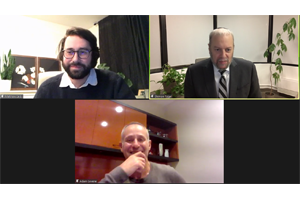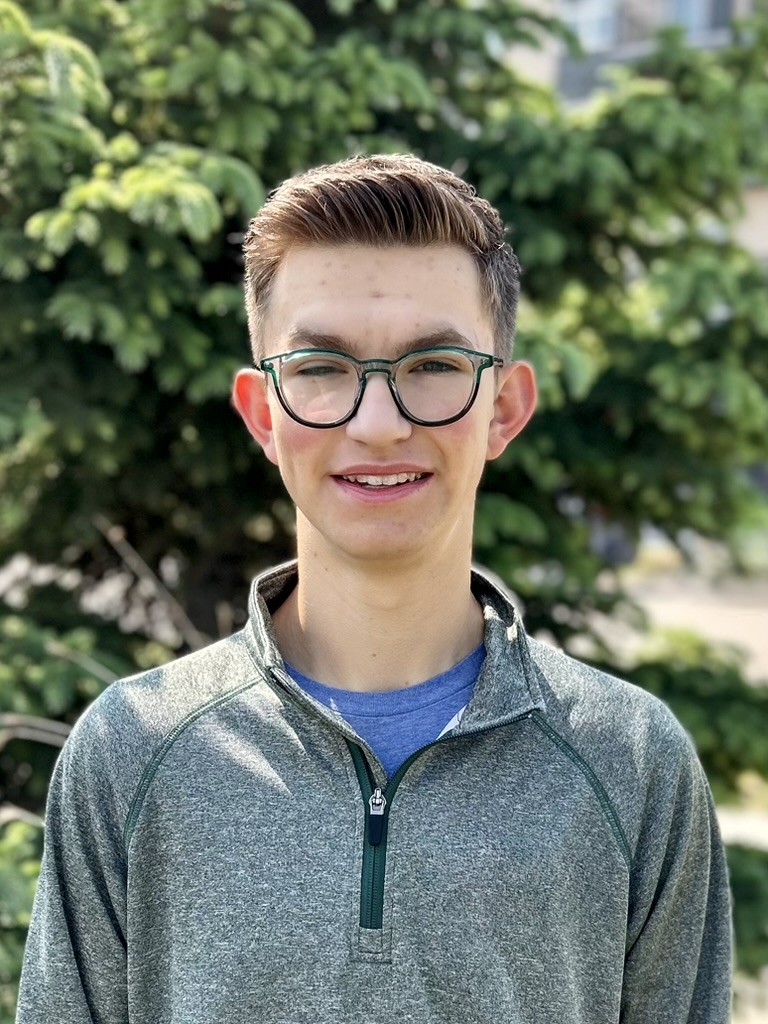Local News
Jewish Federation presents discussion of antisemitism in Canada

By BERNIE BELLAN On Wednesday, October 14, the Jewish Federation of Winnipeg presented a conversation between Rabbi Matthew Leibl and CIJA (Centre for Israel and Jewish Affairs) CEO Shimon Koffler Fogel titled: “Antisemitism in Canada: Pushing back against hate”.
In introducting Fogel, Leibl made the following observation about his not having been exposed to antisemitism during the six years he spent as a radio show host prior to his becoming a rabbi at the Shaarey Zedek: “In the six years I spent on the air I never experienced anything like it (antisemitism).”
That observation served as a prelude to Leibl’s asking Fogel, “How familiar do you think people are with antisemitism?”
Fogel responded: “I am increasingly uncomfortable with the term ‘antisemitism’. Our concern is hatred directed toward the Jews…There has been a steady increase in unabashed hatred toward Jews…The overwhelming majority of antisemitic animus toward Jews is rooted in ignorance…Anything born out of ignorance can be healed with education, but what we really have to be concerned about is the 20 percent of antisemitism that comes out of real hatred toward Jews, not ignorance.”
Leibl asked: “How do we balance the distinction between antisemitism and antiZionism?”
Fogel: “I reject the understanding that ‘everything has changed as a result of the conflict between Israel and Gaza’ ”(last May, which led to a marked upsurge in antisemitic behaviour, especially on the internet).
“What has been happening is an effort to redefine how we think about society.”
Fogel went on to explain that Israel makes for an easy target, especially for those on the left. He referred to Naomi Klein (“Progressive” hero who has often criticized Israel) as having remarked, in explaining why so many on the left attack Israel when there are so many other countries that have far worse records when it comes to human rights: “Israel is the low hanging fruit.”
Fogel added that “Israel is the proxy for the Jewish people. To treat differently the aspirations of the Jewish people is antisemitic.”
He referred to instances this past May in Montreal when Hamas supporters would drive through Jewish neighbourhoods of Montreal in their cars, shouting “Hitler didn’t finish the job” or “We’re coming to get you.”
There is “an artificial distinction between the Jewish people and the Jewish state,” Fogel suggested.
Leibl asked: “Are there tools we can use when tension is raised?”
Fogel: “We have to separate things into two categories: What we used to do – which was target certain political groups in an effort to win support for Israel and what we need to do more of, which is recognize that we actually have a second target group within our own constituency” (members of the Jewish community who are quite critical of Israel).
Turning to the subject of social media, Fogel had this to say: “There is a sense of inadequacy how to answer (antisemitic posts) on social media.” Again, he pointed to divisions within the Jewish community itself, saying “We’ve become fractured, we’ve become polarized. A community that isn’t unified has lost its effectiveness.”
Still, Fogel wanted to emphasize that it is “unity – not uniformity” that the Jewish community has lost. “We’ve lost the principle of consensus,” he observed.
Yet, in responding to antisemitic social media, Fogel noted the challenges that pertain to how small the Jewish community is worldwide, in comparison with the Muslim community, for instance (although he was also quick to note that by no means are all Muslims antisemitic).
“We have to develop a greater facility to respond to social media,” Fogel said, including doing the following:
We have to “educate” – something that is a result of “an ignorant multi-generational deficit”.
We have to draw a “distinction between activism and advocacy”. In doing that, we must enter into an “exercise of valuing the principles of inclusion and mutual self-respect.”
Leibl followed up Fogel’s suggestion, asking “So, who’s the ‘we’ who does that?”
Fogel suggested that “Federations are the key hubs – maybe not the main points of contact for Jews, but the best places to provide resources” for combating antisemitism.
Yet, as much as antisemitism is certainly a problem in Canada, Fogel conceded that “the vast majority of social media posts originate outside of Canada” – which makes it very hard to counter, even if there were some government regulation of social media in this country
“We’ve called on the federal government to introduce an online anti-hate strategy,” Fogel said, but Canada alone isn’t going to be able to do it.”
“We’re going to have to generate a global consensus so that posts generated in Iran and which are seen in the U.K. (for example)” can be regulated in the U.K.
When it comes to hatred toward Jews on social media, moreover, Fogel pointed out that “both extremes (left and right) are toxic to the Jewish community. Unless there’s a coercive element imposed upon them,” he added, “they’re not going to change.”
However, there’s another element to trying to control social media, Fogel said, which is “that in order to have an impact we actually have to surrender control” – not to governments, but to “influencers”.
In this new world of social media it is the importance of “influencers” we have to acknowledge, Fogel argued: people who don’t “create” content on social media, “they report” what others have produced.
“We have to reach out to the real influencers,” Fogel suggested. He pointed to the influence someone like Lebron James has – with his “37 million followers on Twitter”.
For someone like Lebron James (and if you’re reading this and don’t have a clue who Lebron James is, he’s an American basketball player), “the most important influence Lebron James is going to have isn’t what he tweets, it’s what he retweets,” according to Fogel.
“The best way to get control is to give up control” to young influencers.
Interesting proposition, I suppose. But how the heck are you going to be able to persuade young influencers to take on antisemitism online? Is Kylie Jenner interested in anything more than her latest brand of eye shadow, I wonder? Now, if Bar Rafaeli or Gal Gadot were to join forces with the Kardashians, maybe that would work. Now there’s an idea!
Local News
Further to the Simkin Centre’s financial situation

By BERNIE BELLAN A while back I published an article about the deficit situation at the Simkin Centre. (You can read it at “Simkin Centre deficit situation.“) I was prompted to write that particular article after reading a piece written by Free Press Faith writer John Longhurst in the August 5 issue of the Free Press about the dire situation personal care homes in Winnipeg are in when it comes to trying to provide their residents with decent food.
Yet, Longhurst made one very serious mistake in his article when he wrote that the “provincial government, through the Winnipeg Regional Health Authority, has not increased the amount of funding it provides for care-home residents in Manitoba since 2009.”
In fact, the WRHA has given annual increases to personal care homes, but its allocations are not broken down by categories, such as food or salaries. As a spokesperson for the WRHA explained to me in an email: “PCHs receive per diem global operating funding based on the number of licensed beds they operate. This funding model is designed to support the full range of operating costs associated with resident care, including staffing, food services, utilities, building operations, and other day-to-day expenses.”
Now, one can make a perfectly valid argument that the level of funding from the WRHA has not kept up with inflation, especially inflation in food costs, but the Simkin Centre is in an even more precarious position because of the skyrocketing cost of kosher food.
“In recent years,” according to an article on the internet, “the cost of kosher food has increased significantly, often outpacing general food inflation due to unique supply chain pressures and specialized production requirements.”
Yet, when I asked Laurie Cerqueti how much maintaining a kosher facility has cost the Simkin Centre, as I noted in my previous article about the deficit situation at Simkin, she responded: “approximately $300,000 of our deficit was due to food services. I do not have a specific number as far as how much of the deficit is a result of kosher food…So really this is not a kosher food issue as much is it is an inflation and funding issue.”
One reader, however, after having read my article about the deficit situation at Simkin, had this to say: “In John Longhurst’s article on Aug 5, 2025 in the Free Press, Laurie (Cerqueti) was quoted as saying that the annual kosher meal costs at Simkin were $6070 per resident. At Bethania nursing home in 2023, the non-kosher meal costs in 2023 were quoted as $4056 per resident per year. Even allowing for a 15% increase for inflation over 2 years, the non-kosher food costs there would be $4664.40 or 24% lower than Simkin’s annual current kosher food costs. If Simkin served non-kosher food to 150 of its 200 residents and kosher food to half of its Jewish residents who wish to keep kosher, by my calculation it would save approximately $200,000/year. If all of Simkin’s Jewish residents wished to keep kosher, the annual savings would be slightly less at $141,000.”
But – let’s be honest: Even though many Jewish nursing homes in the US have adopted exactly that model of food service – where kosher food is available to those residents who would want it, otherwise the food served would be nonkosher, it appears that keeping Simkin kosher – even though 45% of its residents aren’t even Jewish – is a “sacred cow” (pun intended.)
So, if Simkin must remain kosher – even though maintaining it as a kosher facility is only adding to its accumulated deficit situation – which currently stands at $779,426 as of March 31, 2025,I wondered whether there were some other ways Simkin could address its deficit while still remaining kosher.
In response to my asking her how Simkin proposes to deal with its deficit situation, Laurie Cerqueti wrote: “There are other homes in worse financial position than us. There are 2 homes I am aware of that are in the process of handing over the keys to the WRHA as they are no longer financially sustainable.”
I wondered though, whether the Simkin Centre Foundation, which is managed by the Jewish Foundation of Manitoba might not be able to help the Simkin Centre reduce its deficit. According to the Jewish Foundation’s 2024 annual report, The Saul and Claribel Simkin Centre Foundation, which is managed by the Jewish Foundation, had a total value of $11,017,635.
The Jewish Foundation did distribute $565,078 to the Simkin Centre in 2024, but even so, I wondered whether it might be able to distribute more.
According to John Diamond, CEO of the Jewish Foundation, however, the bylaws of the Foundation dictate that no more than 5% of the value of a particular fund be distributed in any one year. There is one distinguishing characteristic about the Saul and Claribel Simkin Centre Foundation, in that a portion of their fund is “encroachable.” The encroachable capital is not owned by JFM. It is held in trust by JFM but is beneficially owned by Simkin, similar to a “bank deposit”. While held by the JFM, these funds are included in the calculation of Simkin’s annual distribution.
I asked John Diamond whether any consideration had been given to increasing the distribution that the Jewish Foundation could make to the Simkin Centre above the 5% limit that would normally apply to a particular fund under the Foundation’s management.
Here is what John wrote in response: “The Simkin does have an encroachable fund. That means that at their request, they can encroach on the capital of that fund only (with restrictions). This encroachment is not an increased distribution; rather, it represents a return of capital that also negatively affects the endowment’s future distributions.
”It is strongly recommended that encroachable funds not be used for operating expenses. If you encroach and spend the capital, the organization will receive fewer distribution dollars in the next year and every year as the capital base erodes. Therefore, the intent of encroachable funds is for capital projects, not recurring expenses.”
I asked Laurie Cerqueti whether there might be some consideration given to asking for an “encroachment” into the capital within the Saul and Claribel Simkin Centre Foundation?
She responded: “We are not in a position where we are needing to dip into the encroachable part of our endowment fund. Both of our Boards (the Simkin Centre board and the Saul and Claribel Simkin Centre Foundation board) are aware of our financial situation and we are all working together to move forward in a sustainable way.”
At the same time though, I wondered where donations to the Simkin Centre end up? Do they all end up in the Simkin Centre Foundation, for instance, I asked Laurie Cerqueti on December 15.
Her response back then was: “All donations go through our Foundation.”
I was somewhat surprised to read that answer, so I asked a follow-up question for clarification: “Do all donations made to the Simkin Centre end up in the Simkin Centre Foundation at the Jewish Foundation?”
The response this time was: “No they do not.”
So, I asked: “So, how do you decide which donations end up at the Foundation? Is there a formula?”
Laurie’s response was: “We have a mechanism in place for this and it is an internal matter.”
Finally, I asked how then, the Simkin Centre was financing its accumulated deficit? Was it through a “line of credit with a bank?” I wondered.
To date, I have yet to receive a response to that question. I admit that I am puzzled that a personal care home which has a sizeable foundation supporting it would not want to dip into the capital of that foundation when it is facing a financial predicament. Yes, I can see wanting the value of the foundation to grow – but that’s for the future. I don’t know whether I’d call a $779,425 deficit a crisis; that’s for others to determine, but it seems pretty serious to me.
One area that I didn’t even touch upon in this article, though – and it’s something I’ve written about time and time again, is the quality of the food at the Simkin Centre.
To end this, I’ll refer to a quote Laurie Cerqueti gave to John Longhurst when he wrote his article about the problems personal care homes in Winnipeg are facing: “When it comes to her food budget, ‘we can’t keep making the same number of bricks with less straw.’ “
Local News
Exclusive: Security Enhancement Fund to be announced by Province in coming days

By NOAH STRAUSS The province is set to announce a new program called the Security Enhancement Fund, which
will provide funding to religious and faith groups to improve security at institutions such as
synagogues and mosques. In an exclusive interview, Minister of Justice Matt Wiebe outlined the
plan and detailed what the province has already done to help protect Jewish Manitobans.
“What we want to do is to be able to provide the community with the kind of tools that they need
to stay safe and to ensure that everyone in the community feels safe,” said Wiebe.
The fund will provide a missing link between government and religious communities, and
communities will now be able to make their own choices without money being a big restraint.
Essentially, the power will be in the hands of community leaders and not government officials.
The minister noted that the new partnerships will provide the province a better understanding of
the needs of every community. Rather than the province making the choices, they are
essentially giving a voice to each community. The grants, totalling $1 million, will provide funds to enhance security at facilities like synagogues.
The Jewish Post reached out to Dr. Rena Secter Elbaze, executive director of Congregation
Shaarey Zedek. “It’s important that the government show us that they’re taking security seriously and stepping up to the plate to make this offer. We will absolutely be applying for grant money,” she said. Elbaze also wants to know whether or not the government will cover the costs of things the synagogue has already spent money on. She noted that the province has, in the past, made grants available to have security guards present.
When speaking about what the Justice Ministry has already done to protect Jewish Manitobans,
Wiebe brought up the new special prosecutor that is focusing on hate crimes. Wiebe said the
special prosecutor works closely with the Winnipeg Police Service “to support investigations and
prosecute hate crimes. Wiebe also went on to say how the Department of Education has been helping to fight antisemitism. “The creation of the Holocaust education curriculum is an important step in the right direction,” he said. When asked about Oliver Didtger Ederhof, the individual charged with 14 counts of mischief including vandalism of Shaarey Zedek, Wiebe said decisions like bail and police undertakings are decisions that are in part made by the federal government through the criminal code and policies. “We’re going to continue to advocate for stricter bail reform at the federal level…. I’ve been very clear, we issued clarified directives around bail to our Crown prosecutors.”
The full announcement from the province is expected in the coming days.
Local News
March of the Living 2023 participants form Taste of Hope project to help honour the memory of Holocaust survivor Alex Buckman

By BERNIE BELLAN The March of the Living is an annual two-week international educational program that brings thousands of students and adults to Poland and Israel to study the Holocaust, Jewish history, and the rise of the State of Israel. Founded in 1988, it features a 3-kilometer silent walk from Auschwitz to Birkenau on Yom HaShoah (Holocaust Remembrance Day).
Attendees on the march are accompanied by adults, some of whom themselves have been Holocaust survivors.
Following the week in Poland, participants travel to Israel to observe Yom HaZikaron (Israel’s Memorial Day) and celebrate Yom HaAtzmaut (Israel’s Independence Day), marking a journey from darkness to life.
For many years the coordinator of the march in Winnipeg was Roberta Malam, working on behalf of the Jewish Federation of Winnipeg. More recently Abby Flackman filled that role, and now the person in charge is Lindsey Kerr.
Since its inception 37 years ago the March of the Living has become a rite of passage for many young Winnipeg Jews who have been able to participate as an organized group from Winnipeg and combine visits to the death camp at Auschwitz-Birkenau in Poland with the subsequent trip to Israel.
Then – the Covid pandemic hit – in 2020, and the March of the Living was put on hold for two years – in 2020 and 2021.
In 2022, the March of the Living resumed, but there was no organized contingent from Winnipeg participating. (There may have been some Winnipeggers who did go on the march that year, but if there were any they would have been part of a general Canadian group since there was no Winnipeg coordinator that year.)
In 2023, however, once again a very large contingent of young Canadian Jews – 51 altogether, of whom approximately two-thirds were from Winnipeg, went on that year’s March of the Living. That particular march was memorable for many reasons, including the fact it was the last full march since 2019 and was to remain the last march to have an organized Winnipeg contingent in the past six years as the years 2024 and 2025 were interrupted by the war in Gaza. (There were smaller marches held in 2024 and 2025, but again there was no organized contingent from Winnipeg.)
Recently, we were contacted by one of the participants of that 2023 march, Ethan Levene, who asked us whether we’d be interested in running what turned out be a very poignant story about one particular aspect of that 2023 March of the Living.
Here is what Ethan wrote:
“In April 2023, the Coast to Coast Canadian delegation of March of the Living was privileged to travel with Holocaust survivor Alex Buckman (z”l). March of the Living is a Holocaust education trip that allows participants to visit and bear witness to the sites of the Holocaust. Unfortunately, while sharing his story in Poland, Alex passed away. However, the impact he left on us students was immeasurable.

“While speaking to us in Warsaw, Alex told us the story of his Aunt Becky’s gâteau à l’orange (orange cake). While in Ravensbruck concentration camp, his aunt managed to write down this recipe. After his parents’ murder, his Aunt Becky went on to raise Alex after surviving. In addition to sharing his story, Alex tasked us with baking the cake with family and friends.
“Out of this, a group of alumni from our trip have created this project: ‘A Taste of Hope.’ On February 1st, university students from over 5 universities across Canada will come together to bake the gâteau à l’orange and hear Alex’s story. Proceeds from the event and this fundraising page will support the World Federation of Jewish Holocaust Survivors and Descendants. Alex was heavily involved with this organization, whose mission is to both create community for Holocaust survivors and their descendants and educate about the Holocaust to help fight against antisemitism and all forms of bigotry and hate.
“Here is information from our fundraising page for the event – ‘A Taste of Hope’: Fundraising for A Taste of Hope.
Ethan added that “it’s completely student led, all by alumni from our 2023 trip attending university at these various locations across Canada; Winnipeg, London, Kingston, Montreal.”
He also added: “Follow us on instagram@tastehope.“
Here is a link to a CBC story about Alex Buckman: Alex Buckman story
In a subsequent email Ethan gave the names of Winnipeggers who are involved in A Taste of Hope: Ethan Levene (studies at McGill), Zahra Slutchuk, Alex Stoller (studies at Queens), Coby Samphir, Izzy Silver (studies at Waterloo).
He also added names of others who are involved in the project: Jessie Ages, Anneke Goodwin, Lilah Silver, Ella Pertman, Ellie Vogel, and Talia Cherun.
To find out more about March of the Living in Winnipeg go to: March of the Living


